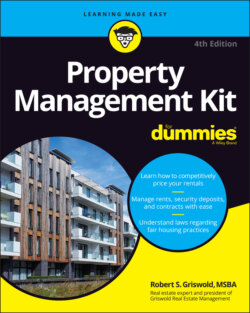Читать книгу Property Management Kit For Dummies - Robert S. Griswold - Страница 46
Being Honest with Yourself about Your Skills and Experience
ОглавлениеOne of the first steps in determining whether to manage your rental property on your own or delegate some or all of the duties is analyzing your skills and experience. Many successful property owners find that they’re better suited to deal-making than to problem-solving and endlessly interacting with people, so they leave day-to-day management to someone else.
This decision is a personal one, but you can make it more easily by thinking about some of the specifics of managing property. Property management requires basic skills, including marketing, management, accounting, and people skills. You don’t need a college degree or a lot of experience to get started, and you’re sure to pick up all kinds of ideas about how to do things better along the way.
Examine your own personality. Are you a people person? Serving as a landlord is a labor of love; you must love people, you must love working with your hands, and you must love solving problems. Most of all, you must be able to do all these things without getting much back in the way of appreciation.
Whether you’re confident that you have what it takes to be a good rental property manager or are still not sure, take stock of yourself and your abilities by answering the following questions. Interview yourself as though you were a job applicant. Ask yourself these tough questions, and (more important) answer them honestly:
Are you a people person who enjoys working with others?
Can you keep your emotions in check and out of your business decisions?
Are you a patient and reasonably tolerant person?
Do you have the temperament to handle problems and respond to complaints and service requests in a positive, rational manner?
Are you well organized in your daily routine?
Do you have strong time-management skills?
Are you computer-literate?
Are you meticulous about your paperwork?
Can you write well enough to communicate effectively?
Do you have basic accounting skills?
Do you have maintenance and repair abilities?
Are you willing to work and receive phone calls, emails, or texts on evenings and weekends?
Do you have sales skills? Can you be creative in attracting rental applicants?
Are you a good negotiator?
Are you willing to commit the time and effort required to determine the right rent for your rental unit?
Will you be persistent in collecting the rent?
Are you familiar with (or willing to find out) about the ever-changing laws that affect property management in your area?
Are you able and willing to visit your residential rental property regularly?
Are you willing to enforce all property rules and rental policies consistently and fairly?
Are you interested in finding out more about property management?
Are you willing to make the commitment to be your own property manager?
Ideally, you answered each question with “yes.” This assessment isn’t scientific, of course, but it does raise some important issues, particularly the level of commitment that you need to succeed as a residential rental property manager.
You need to be fair, firm, and friendly to all rental prospects and tenants. Treat everyone impartially, and remain patient and calm under stress. Be determined and unemotional in enforcing rent collection and your policies and rules. Maintain a positive attitude through it all. The job isn’t as simple as it seems, is it?
Even if you didn’t answer all the questions in this section with an enthusiastic “yes,” you may still make a good rental property manager if you’re prepared to be flexible and to learn from your property management experiences. Some of the best property managers graduated from the school of hard knocks.
If your assessment revealed that your skills may be better used for something other than managing your own property, see Chapter 3 for some alternatives. Owning rental property can still be a great investment, even if you don’t manage it yourself.
If you’re impatient or easily manipulated, you aren’t suited to be a property manager. Conveying a professional demeanor to your tenants is important, because you want them to see you as someone who’ll take responsibility for the rental property’s condition. You must also insist that tenants live up to their part of the deal; pay their rent regularly; and refrain from causing unreasonable wear, tear, or damage to your property. If you don’t like confrontation, managing your own rental property may not be the wisest choice.
